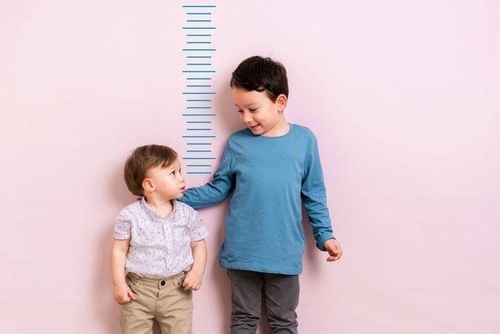This is an automatically translated article.
Children or children with excess calcium have bad consequences for the body. When asked, parents can easily answer that calcium deficiency will affect children's height, but not everyone knows that children with excess calcium are also the cause of easy dwarfism.
1. Causes of calcium excess in children
Children's calcium excess is a condition where the calcium concentration in the child's body is higher than normal, which can cause many bad effects on the health of the child. Children with excess calcium can be due to the following reasons:
Calcium supplements without consulting a doctor: the use of calcium supplements for children is now very popular with the concept of optimal height development. high for children, but if you arbitrarily give it to your child without consulting a doctor, it is likely the cause of your child's excess calcium. Improper nutrition: giving children too many calcium-rich foods can easily make children excess calcium. Giving children calcium-fortified formula milk and using milk to completely replace filtered water is a wrong habit that many parents are using that can cause children to have excess calcium. Suffering from some diseases: in many other cases, children have too much calcium because of diseases. Some granulomatous diseases such as tuberculosis, sarcoidosis, ... can increase blood levels of vitamin D, stimulate the digestive tract to absorb more calcium from the diet, and as a result, the child has an excess of calcium. In addition, hyperparathyroidism is also the cause of excess calcium in children. Heredity: A few cases of children with excess calcium are hereditary, these cases make the calcium receptors in the body not work, increasing blood calcium.
2. Why are children with excess calcium prone to dwarfism?
Calcium supplementation for children from an early age is necessary to support the development of bones and teeth in children. But in fact, how to supplement with how much to absorb well, not all parents know. Therefore, many people have given their children high-calcium dairy products or calcium-rich functional foods since birth without understanding the harmful effects of excess calcium on young children. So what's wrong with children with excess calcium? Although calcium helps bones and teeth develop and perfect well, when children have too much calcium, they will face many health risks such as reduced absorption of other minerals such as iron, zinc, magnesium, phosphorus, etc. If the child is malnourished, if the condition persists, the child may also develop kidney stones or other calcification conditions. More ominously, children with excess calcium may be prone to dwarfism, this phenomenon is explained as follows:
After birth, the child's height increases thanks to the process of ossification of the cartilage of the head of the long bones. lengthen these bones. When the bones are not completely ossified, the bones can still lengthen and the child's height can continue to grow until the age of 25. When children have too much calcium, the calcium content in the blood increases and goes into the bones more, making the cartilage ossification process not optimal, but the bones are mineralized and hardening occurs earlier, leading to growth restriction. bones, negatively affecting the height development history of children. Therefore, in children with excess calcium, they are likely to experience dwarfism or stop growing in height.

Trẻ em thừa canxi có thể dễ bị lùn hơn các trẻ khác
3. What are the symptoms of children with excess calcium?
Constipation is a common sign in children with excess calcium: Science has proven, children can only absorb 60% of the calcium provided, the remaining excess calcium combines with fiber in food and suffers from constipation. excreted out. Calcium has a high affinity for water, so it easily combines with water in the large intestine to make stools solid and hard, causing constipation. Abdominal pain, nausea: are common manifestations of children with excess calcium. Too much calcium makes a child's body produce too much parathyroid hormone, increasing the risk of hyperthyroidism - a disease that makes children feel nauseated, sometimes affects the stomach and causes discomfort. Anorexia: children with excess calcium do not eat well, or cause digestive disorders, diarrhea, and reduce the absorption of other nutrients. Nutritional deficiency: the amount of calcium absorbed by the body increases, reducing the absorption of other nutrients such as iron and zinc, children with excess calcium put the body at risk of deficiency of these two substances, which is not good for health. . Muscle aches: children with excess calcium may experience abnormal muscle contractions, cramps, and muscle aches. Often tired and distracted: children with excess calcium, the amount of calcium in the blood increases, interferes with brain activity, leading to children losing focus, lethargy, and easily tired, heavier than children can be. depressed . A physical exam can detect high levels of calcium in your baby's blood.
4. Preventing children from excess calcium
4.1 Understanding the need for recommendations: First of all, parents need to understand the need for calcium recommendations for their children by age to supplement properly and enough to limit the occurrence of calcium deficiency or excess in children. . According to the table of nutritional needs recommended for Vietnamese people in 2016, children need to be supplemented with calcium as follows:From 0-5 months old need 300 mg of calcium/day From 6-11 months old need 400 mg of calcium/day From 1-2 years old need 500 mg of calcium/day From 3-5 years old need 600mg of calcium/day From 6-7 years old need 650mg of calcium/day From 8-9 years old need 700mg of calcium/day For children over 10 years old need 1000mg of calcium/ day.

Bổ sung đúng liều lượng giúp phòng tình trạng trẻ em thừa canxi
Please regularly visit Vinmec.com website and update useful information to take care of your baby and family.













